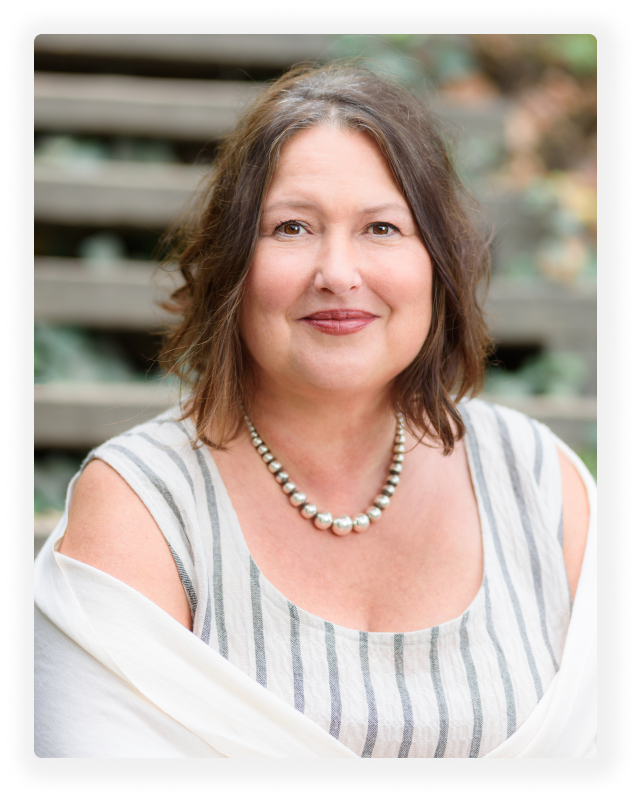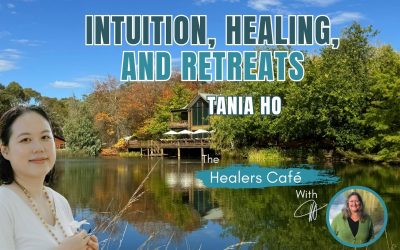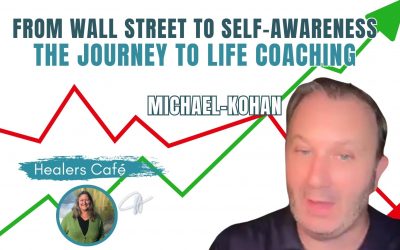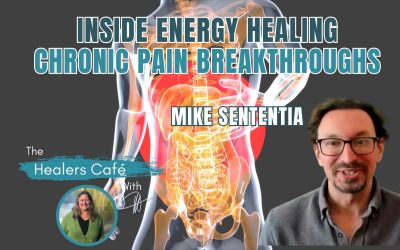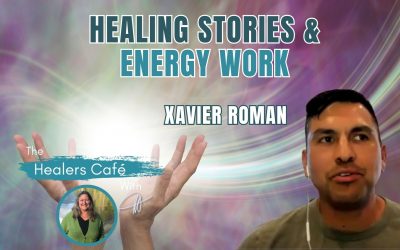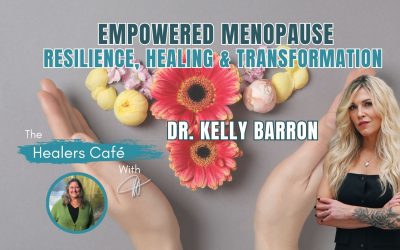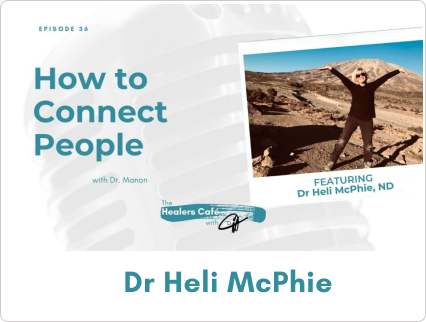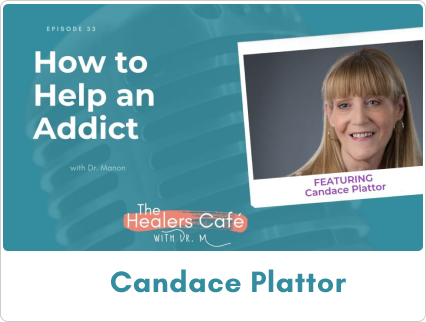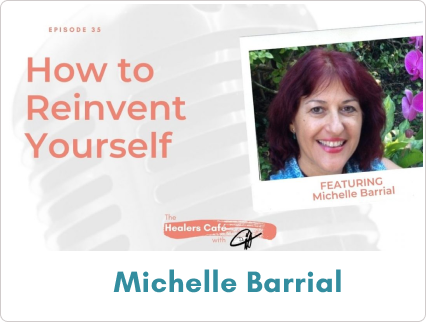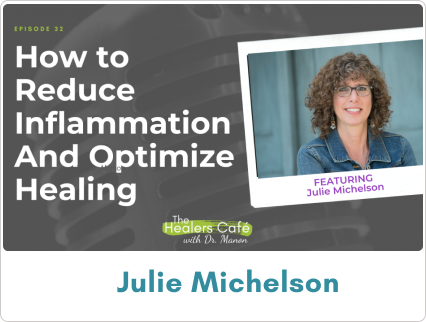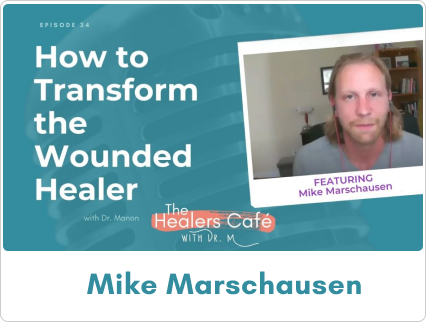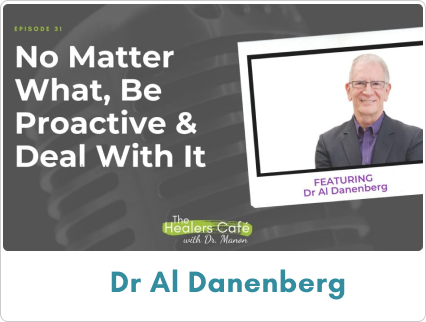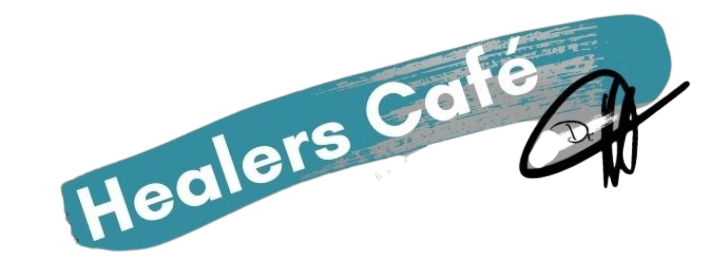

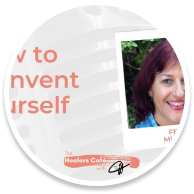
Michelle Barrial
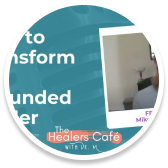
Mike Marschausen
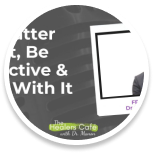
Dr Al Danenberg
iTunes | Google Play | Spotify, | Libsyn | iHeartRadio | Gaana | The Healers Cafe | Radio.com | and many more
FEATURED INTERVIEWS
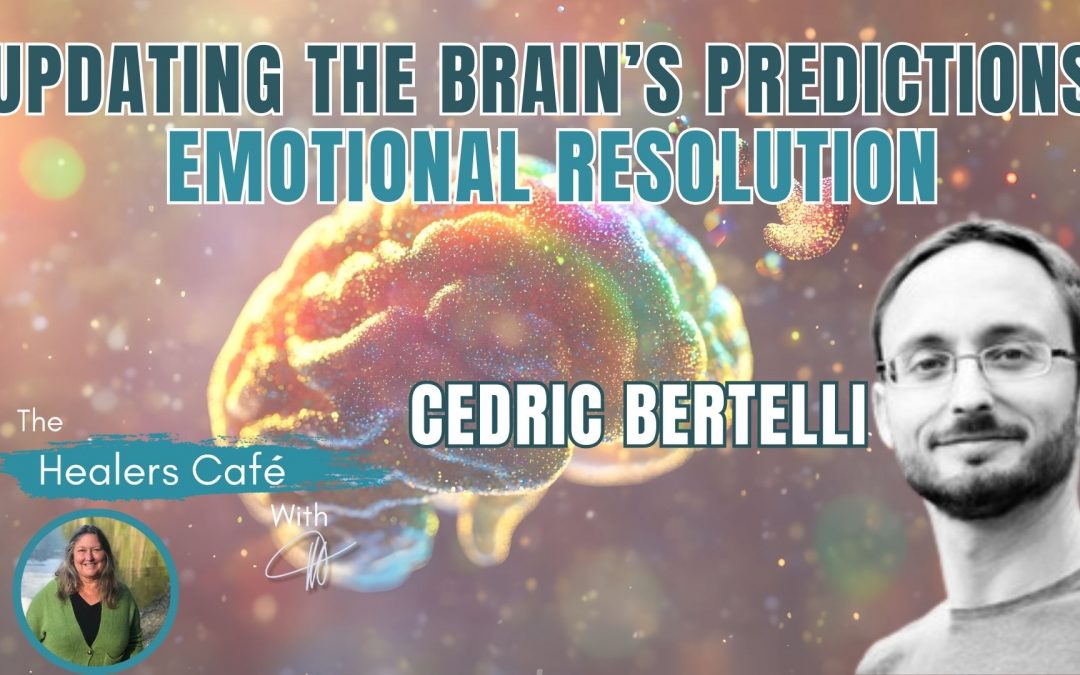
Cedric Bertelli
Updating the Brain’s Predictions: Emotional Resolution with Cedric Bertelli & Manon on The Healers Café
In this episode of The Healers Café, Manon Bolliger, speaks to Cedric Bertelli, founder of the Emotional Health Institute, discusses his methodology, Emotional Resolution (EMRS), which addresses emotional imprints through somatic neuroscience. Inspired by his grandfather’s resilience post-WWII, Cedric developed EMRS to help individuals resolve emotional patterns by feeling physical sensations without control. He explains that the brain predicts emotions based on past experiences, often rooted in trauma, and EMRS allows these predictions to play out naturally, updating the brain’s response.
Highlights from today’s episode include:
Emotions are outdated predictions: Debilitating emotions are often outdated predictions from the brain, triggered when current stimuli resemble elements from past traumatic moments. The body then recreates old physical sensations (interoception), even when they’re no longer relevant.
Resolution by fully feeling sensations (90 seconds) : If a person can safely stay with the raw physical sensations of an emotion—without trying to regulate, fix, or control them—the interoceptive wave naturally completes within about 30–90 seconds, and the brain updates its prediction, so the same stimulus no longer triggers that reaction.
– – – – –
Stop building stories; stay with the body: Manon emphasizes the importance of not creating or feeding mental stories about what we feel. By witnessing the emotion innocently and staying with the body’s sensations rather than the narrative, we allow real resolution instead of reinforcing the pattern.
ABOUT CEDRIC BERTELLI:
Cedric Bertelli is the founder of the Emotional Health Institute and co-developer of Emotional Resolution® & EmRes®, a somatic, neuroscience-based approach for resolving emotional imprints. Before dedicating himself to emotional health, Cedric spent more than a decade in the hospitality industry, including leadership roles with The Ritz-Carlton Hotel Company, where he developed a deep understanding of human behavior and service.
Over the past 15 years, he has trained practitioners across the world, guided thousands of clients, and partnered with researchers at UCLA and UCSF to advance the scientific foundations of EmRes. His work focuses on making emotional healing simple, effective, and accessible so people can live with greater clarity, ease, and resilience.
Core purpose/passion: My core purpose is to help people reconnect with their natural capacity to resolve emotional pain. Not to manage it, not to suppress it, and not to build workarounds around it — but to truly resolve it at the physiological level so they can live with more freedom, presence, and ease.
ABOUT MANON BOLLIGER, FCAH, RBHT
As a recently De-Registered board-certified naturopathic physician & in practice since 1992, I’ve seen an average of 150 patients per week and have helped people ranging from rural farmers in Nova Scotia to stressed out CEOs in Toronto to tri-athletes here in Vancouver.
My resolve to educate, empower and engage people to take charge of their own health is evident in my best-selling books: ‘What Patients Don’t Say if Doctors Don’t Ask: The Mindful Patient-Doctor Relationship’ and ‘A Healer in Every Household: Simple Solutions for Stress’. I also teach BowenFirst™ Therapy through Bowen College and hold transformational workshops to achieve these goals.
So, when I share with you that LISTENING to Your body is a game changer in the healing process, I am speaking from expertise and direct experience”.
Mission: A Healer in Every Household!
For more great information to go to her weekly blog: http://bowencollege.com/blog.
For tips on health & healing go to: https://www.drmanonbolliger.com/tips
SOCIAL MEDIA:
– Linktr.ee | Rumble | Gettr | Facebook | Instagram | LinkedIn | YouTube | Twitter |
About The Healers Café:
Manon’s show is the #1 show for medical practitioners and holistic healers to have heart to heart conversations about their day to day lives.
Subscribe and review on your favourite platform:
iTunes | Google Play | Spotify | Libsyn | iHeartRadio | Gaana | The Healers Cafe | Radio.com | Medioq | Audacy |
Follow The Healers Café on FB: https://www.facebook.com/thehealerscafe
Remember to subscribe if you like our videos. Click the bell if you want to be one of the first people notified of a new release.
* De-Registered, revoked & retired naturopathic physician after 30 years of practice in healthcare. Now resourceful & resolved to share with you all the tools to take care of your health & vitality!
TRANSCRIPT
Introduction 00:00
Welcome to the Healers Café. The number one show for medical practitioners and holistic healers, to have heart to heart conversations about their day to day lives, while sharing their expertise for improving your health and wellness.
Manon Bolliger 00:20
So welcome to the Healers Cafe, and today I’m with Cedric Bertelli, and he has created a methodology called em res, or emotional resolution. And he’s the founder of the Emotional Health Institute, and therefore co founder of this technique, and it’s a somatic neuroscience based approach for resolving emotional imprints. And I think part of it you you had a lot of experience understanding human behavior through your hospitality experience at the Ritz Carlton and then other trainings, and basically, one way or another, you got to this, and that’s actually my first question to you, so What, what brought you to this juncture, or this creation. Yeah, how did it happen for you?
Cedric Bertelli 01:27
Hi, Manon, welcome. Thank you very happy to be here, and thank you for for having me. How I came onto this field, I will say it’s, it’s, I guess life bring you there right one way or another, I think I started getting interested in this type of work on resolving or releasing anxiety, because I was suffering myself with a lot of anxiety and self directed anger, low grade depression, and that’s something that I hid most of my life, you know, up until my late 20s. You know, no one in my in my previous career, as you said, I was working for for hotels and restaurant, no one knew that I was dealing with this anxiety and and depression. And I tried different things on myself at the time, psychotherapy and other other modalities, and I’ve understood maybe why I felt that way, and I learned to control the way that I was feeling, try to regulate it, but I never was free of it. It was a constant battles to speak, right, hiding, controlling, etc. And the reason why I decided to shift is because I wanted to see if something else was possible. And one of the the examples for me, I often talk about it, is my grandfather. My grandfather was a world war two veteran, and as I I grew up with him around him, and later on, when I started to question my my own emotional health. I was wondering how a man who lived so much atrocity, right, he was in what you call a friend in French, the Maquis, which were like those men that were not in the military, but were hiding in the forest, listening to specific messages on the radio, code and messages and then do actions again. The Nazis, how can him and men like him were able to tap into so much resilience when they had absolutely no help, right? They didn’t have psychotherapy, they didn’t have none of this, right? And so that was from when I started to get interested in my own health. It’s like, what, what was he able to do, and what all the men, not that very, I’m very conscious that it was also PTSD from World War Two veterans. I’m not, I don’t live in LA, LA LAND. But the way that they were resilient was very different from the way that I was resilient when I didn’t know, you know, that didn’t fight any, any war, and still, my life was very difficult inside. So anyway, that was the bridge, right, right. How can this type of people were able to be resident without any help, and how me? Well, quote, unquote, normal life with just work and live drama. How is it that I cannot find this peace within myself? So that’s that was, that was kind of like, I guess, the thought process, you know,
Manon Bolliger 04:29
right, right? So what was the conclusion?
Cedric Bertelli 04:33
I think the conclusion for for men like my grandfather, and it’s after the war, they they had to take care of their family. So after the war, in my grandfather case, for example, they worked outside. Him, he was working in the woods. He was a lumberjack, and in the in vineyards, working outside, moving their body among men who shared a similar experience. Sense. They never talked about the war after the war, but they shared a similar experience and with a sense of purpose. I think those three elements, nature and moving your body in nature community have an ..
Read more...
unspoken, unspoken, lived experience and a strong sense of purpose. There’s no other choice that to make money work and raise my family from absolutely nothing to to some kind of, some kind of a better status, right? There’s no choice. Was no choice to do anything else, because other than that, it was just the death of the family, so to speak, right? So I think, I think that’s that was in their case, for for a lot of them, I think that was the the alchemical solution. I think when it comes to to my own experiences, when I started to study the body and how to use the physical sensations present in emotions, to resolve those emotions. This is when, when I the more I move my attention and my research into the physical sensations in the body, what we call interoception at the time of an emotion, the more I started to understand the process of how the brain constrict emotion, and then, of course, studying and reading neuroscience and collaborating with doctors such as Dr Jacques femex In France, it became very clear. We know today how the brain constrict emotion, and from this understanding, it’s actually quite simple to understand how the brain can undo those debilitating emotional pattern not cognitively, but through the body.
Manon Bolliger 06:44
So in the method that you’ve put together, what, what is the the way of, or, I mean, you can perceive the like the interception, like, what’s the body is saying, but the interpretation of that, how? What is the process? I’m not trying to get the rights to your just asking, generally, how does this work? How do, how can people learn to do this? Absolutely method?
Cedric Bertelli 07:15
Yeah, absolutely. I mean to go back a bit on my grandfather when, when he was crossed by an emotion. You know, when he felt, I don’t know when you had a flashback or something like this, and you’re in the wood. What do you do? You do absolutely nothing. You know you you you do nothing. You just feel it. You know, at the end of the day, you feel it within, within some kind of safety surrounding right? Okay, I can tell you about the methodology we created is called MRAs. We created it in its official since 2019 so the base, the foundation of Mrs. Is quite simple. Actually, we know today how the brain constrict emotion. And I can tell you in a nutshell, you probably know. But just in case, you know, some people know we know that was two things to keep in mind when it comes down to emotional functioning. Number one is that the brain constantly predict. And to understand this principle of prediction, I will refer people to Lisa Feldman Barrett, who wrote, Our emotions are made, which is like for me, one of the Bible of the neuroscience of emotion. So two things to remember. Number one, the brain constantly predict. Predict based on past references. Number two, we understand that that the origin of any debilitating emotional pattern is an instant of trauma. So when talking about prediction, I often take the same example, which is, we know, we realize that the brain predict because it does it with everything. For example, food, right? You if you have a Granny Smith sample, for a first time, you have a first experience, the crunchiness, the CDT, the juice, is a first experience. But anytime after that, every time after that, if you take a similar Apple, before you buy the apple, you’re going to predict exactly what experience you’re going to have, to you’re going to you’re going to have, you’re going to have, and sometimes you can vary a little bit, you know, the acidity, etc. But there’s always a prediction before you do the action constantly when you have a cup of coffee, etc, etc, yeah. Another example of prediction is if you come from working out, for example, and you, you’re thirsty, you go into your fridge and you, you drink, I don’t know, a bottle of water you’re going to know when to stop, which is, which is quite amazing, because actually take over 30 minutes for your body to integrate the water. That means that your brain predict how much water you need in order to quench your thirst, right? Then again, it’s prediction. That’s the first thing prediction. Second thing is at the origin of the patterns, is a moment of trauma. Now the problem is on the trauma, the problem or the instant of dissociation happening during the trauma. Hmm, so maybe let’s take a second to talk about what is a trauma? A trauma is an instant that hold too much stress, physical or emotional, for us to integrate at the instant when we live it, when we experience that’s it. It’s just too much. And when it’s too much, very often there is an instant of dissociation. You dissociate so you don’t suffer too much during this very stressful experience. And that’s in the dissociation that the emotional pattern is created. And in a nutshell, when we have this conversation, you and I, our brain, cognitively, consciously, is gathering about 2000 bits of information per second, process at the speed of 150 miles per hour. That’s what we are aware of at the same time, our subconscious has a potential to gather 400 billion bits of information per second, versus 2000 and process it at the speed of 150,000 miles per hour. These are the numbers from the pen University from 2012 and those number varies, but it’s always the same type of scale. The subconscious has a much higher potential and processing much faster when we have a quiet conversation, like we do now Manon, our cognitive is is used as a filter, so the prefrontal cortex filter a lot of this information so we can live in society, so we we can adapt to what we’re supposed to do as humans. But when you, when you experience a trauma and there’s dissociation this, the subconscious takes over. So imagine a vortex, a huge vortex, opening up outside and inside of yourself, gathering all the information available to you during the system of dissociation without any type of filter. So it’s going to gather the temperature, the taste, the texture, the light, all those very physical elements, sensorial elements. And your subconscious is also going to record the physical sensation that you’re feeling at this instant, just like you do when you have an apple, for example. So imagine this vortex open in and out, gathering all this information at a very high speed, at a very high what’s the word definition, but in a non linear way, when the subconscious takes over, nothing makes sense. There’s no logic. It’s ton of information gather without any type of logic. Well later on, and we have those instant of dissociation again and again and again in our life, from the time we’re in utero to the birth process to later on in life, it happens 10th and 10th of times without sometimes noticing it even later on, when the brain finds itself in a situation where it recognizes one or several elements that were present during one of those traumatic event, your brain is going to predict instantly what physical sensations you’re about to feel based on what you felt in your body during a specific event. Those physical sensations is what we call interoception, those physical sensation is what let us know that we feel an emotion. We feel we know that we have anxiety. We feel anxiety. We’re feeling angry or sad or whatever. We know that it’s not in the brain. It’s a conceptualization of physical sensations, physical sensations that are nothing else but an outdated prediction from your brain, because that’s what it is, a debilitating emotional pattern. Basically, when you feel an emotion that is not congruent to your current life, is an outdated prediction from your brain. What does MREs do? Mrs. Letting this prediction play out until the end in a safe environment. Because what we find is quite simple. It is that if a person, when as an emotion start in them, if they can be with the physical sensations, so letting the interoceptive prediction play out until the end in a self in environment without controlling how they feel inside. I mean, no breath, no twisting, no stretching, no touching, no you feel. That’s the only action necessary, what you feel in your flesh, in a safe environment, this interoceptive prediction will never last longer than 90 seconds. It will take two and 90 seconds. Yeah. And the thing is, if you’re able to feel the sensations as they change in your body in a self environment, without impacting them or without impacting your surrounding, at the end of this prediction, your brain is anticipating for you to be healed by some kind of danger, just like it happened years ago. Well, at the end of this prediction, nothing happens from that very second your brain update the prediction whatever stimulus was creating this emotional reaction after this experience will be an absolute non event. It will not trigger the emotion anymore, ever, right?
Manon Bolliger 15:00
So by allowing it to play out for up to about 90 I mean, you don’t stop it, but your experience has been 90 seconds, which I would concur with that too. That’s what I’ve noticed as well. But it’s like, then you’re not. It’s like, it’s like it’s gone through that part. It, it doesn’t need to it, it re it doesn’t have to start at the same base point. Now we’ve got a new base point where there was no trauma. Therefore it updates the cartilage, or whatever you want to say the prediction,
Cedric Bertelli 15:42
yeah, it’s exactly, yeah, it’s the prediction is updated your brain recognize a stimulus that it’s one, it’s one element in your current life that your brain recognize from the past, automatically, instantly, is going to predict what physical sensations you’re about to feel just Well, The thing is, right now, the stimulus is irrelevant to your life. You might be a smell. It might be, for example, let’s say you, we meet you, and you and me for the first time, and we don’t know anything about each other, but you’re going to, you’re going to meet me, and you’re going to going to feel tension in your body. And maybe you’re going to feel tension in your body because, because the way that I look maybe my size, maybe a smell that you don’t even recognize, but it recognized. Your brain recognize it as somebody was, you know, abusive to you, maybe. But the fact of the matter is, something in you is going to recognize something in me, an element, and that’s going to create tension in you. Yeah, it has nothing to do with me, but it’s tension. Your brain is going to conceptualize it. It’s going to say, well, there’s something about civic that I don’t like, and it’s nothing about me. It’s something about an element about me. And we’re going to make up a story on that, and we’re going to this relationship is going to be already floated because of this tension that you have around me, that’s an emotion as well. So here, what I mean is, like a lot of stimuli that we have in our current life have nothing to do with our current existence, right? It is just it’s just vibrating. It’s just mirroring something that happened way way before.
Commercial Break 17:15
What would your life be like if you were pain free, if you were one of the millions who suffer from chronic pain, the thought of just one day without it may seem impossible. This is often because conventional medicine tends to fall short in the treatment of pain, opting to prescribe pills or recommend surgery rather than getting to the root cause of the problem. But if you are suffering with emotional or physical pain, there is hope. Join the founder and CEO of Bowen College, Manon Bolliger, live online for your body mind reboot. Learn how to listen to your symptoms and get to the root cause of your pain, plus be trained in basic Bowen therapy moves so that you can reboot your body for optimal health. You don’t have to live in pain. You can heal, stop the pain pill cycle by visiting www.yourbodymindreboot.com, to learn more and to register you.
Cedric Bertelli 18:24
Yeah, and that put us in trouble or hurt us, right?
Manon Bolliger 18:28
I mean, I think that’s where being aware of the stories we create, you know, or make it mean something, because there’s a part of us that tries to justify or come up with a reasoning or something like this, but to watch it, to be innocent, to be witness to just the emotion, stay with what the body is experiencing. You can remove the thoughts. I mean, just don’t like don’t hook more thoughts to make a story. You know, one of the common, and I was wondering if you had some statement or some experience with this, is the feeling of overwhelm as an emotion, and it’s usually a traumatic emotion. It has it’s not, you know, fear, anger, all of those that are clear this overwhelm. It’s like a It’s an all encompassing, no action to take, kind of thing. And people are quite bewildered in that state. Is there something different about that state or or is it just my experiences that it look it feels different to me than clear emotions
Cedric Bertelli 19:49
for me, there is no experience. And maybe in the in the in the feeling of the person. A lot of time when you feel anxious or angry, you feel sensations, right? There is tension in your body. I. Often with the overwhelm. It’s the contrary that happened. It’s a lack of sensation, a lack of exactly but this lack of sensation, if it is more difficult for somebody to feel by themselves, with a practitioner, they will be able to be conscious of this lack of sensations. So in the brain, it is exactly the same thing, except that instead of being, quote, unquote, flooded by sensation, it’s a complete lack of sensation. So it’s confusing, and you don’t move, and you’re frozen, and it’s you can’t take any action. It’s like life leave you for a little bit. It’s a bit of death. It’s a little piece of death, in a way. And I think it’s what it is. It’s actually a moment of physical death. And the person may have felt, maybe in utero, at birth, or, yeah, in some kind of accident,
Manon Bolliger 20:44
yeah, like the or, you know, trauma before a certain age, like a state of disassociation where there’s no actual recall, you know, yeah,
Cedric Bertelli 20:57
that’s the beauty about this, about Mrs. Is, like, you don’t need to, you need to know where the emotion comes from. Irrelevant. It is irrelevant. You don’t need to know where the emotion comes from. What matters is how you feel today. So even if somebody comes to see us with, Well, I I experienced this or this or that trauma in their life, it’s we don’t we don’t need to. What are the impact of this trauma in your life today? Well, my relationships are this way, self confidence in your life today. What are the impact? Because trauma cannot be healed. You know, it sounds good. You know trauma healing is something that is a good motto. It’s in it sounds good on books, but trauma cannot be healed because trauma happened, no matter what it is. It happened. But what can be healed are the wounds than this? Trauma created this we can heal, right?
Manon Bolliger 21:54
I mean, that could be a bit of semantics too. Yeah, absolutely. The wounds are the impact of the trauma, right? Absolutely. History is history, right? So, yeah, there’s
Cedric Bertelli 22:08
nothing you can do. There’s nothing you can do. And talking about the talking about the trauma again and again, in a way, is anchoring the trauma
Manon Bolliger 22:16
absolutely, yeah, which was the method that was used right? A lot of in psychology, it was a belief that you, you know, hit the pillow, get rid of the anger, it’s like, but you’re just reenacting on a continual basis. So, so can you give? I mean, I can easily come up with any trauma. But can you give an example how this would would look like if somebody came to you or to a practitioner using this method, how, what is a seance like, or a therapy session like? Yes, absolutely.
Cedric Bertelli 23:01
First of all, this work can be done on Zoom, so you don’t need to see people in person. Some people receive clients in person. I don’t anymore, since the pandemic, I didn’t see anybody in person anymore, which, in a way, is is freeing. So it can be done on Zoom or other other platform. The way that it will it will start, will be I would ask my client a simple question, if we could resolve anything within you today, what would that be? If anything could be resolved, what would that be? Wen thing at the time, because often people come with an issue, so it’s a shame, guilt, anger, but from this one issue, there are a lot of other emotion that piled upon it, and maybe some emotion that were before them as well. So we’re going to focus on one problematic, one issue. And the person will tell me, Well, I, I don’t know I, I’m very uneasy in social setup, and I like to, I like to work on that social anxiety. Okay, very well. So we will address this, this problematic in several way. First, we’ll use memories, some memories when the person felt uneasy in public setting, nothing old, everything recent, within the last few weeks of your month. And we would quote, unquote, trick the brain, you know, the for the brain to be confused. Are they at the event again, or are they here? So what we’re trying to do here is to recreating the interception and the person is feeling in a social event, and we become very good at that, so the person will feel the same sensations as they feel in the social event. Now, instead of being in a social event and having to control their behaviors and the way that people interact with them, the safe and sound. So we’re going to feel we’re going to invite the the client in feeling the sensations in a specific way, in a safe environment. And as a practitioner, we’re not going to try to we’re not going to help them. We’re not going to make them feel better. Because if you try to make them feel better, if you tell them that everything is okay. What’s, what’s the point you are. You are controlling the emotion. It’s not going to work. We’re going to be we work with memory a lot, in our positioning as a practitioner, to give intense attention without stepping into the process of the client, right? So that’s one way using memories, recreating interoception and then resolving, and then we’re going to access, for us, the emotions on three layers, so to speak, to keep things to keep things simple. Conscious emotion, which are the emotion why people come to see us most of the time, unconscious emotion, which are the emotions we don’t want to look at, the shame, the guilt, you know, the emotion that we know are there, but because they do not fit with the character that we want to display in life, or the character who we think we are, we don’t want to look at them. And they have a lot of power upon us. Those unconscious emotion and then that the subconscious emotion, the subconscious emotions, or emotions that are not reachable consciously at all, and often they’re just tension in the body, tension that are not strong enough to be conceptualized by the prefrontal cortex, but that are very much creating dynamics in our life. And usually that gives symptoms as well. You know, physical symptoms such as eczema, pain, etc, often come from subconscious fears, because they never, they never attended anyway. So to go back to your, to your, to your answer, I apologize. We going to be using memories. We’re also going to use something that we call impact question, impact question, or question design to raise the fear here and there from the clients, fears that they’re not conscious of. So we ask a specific question. Interception comes, and we resolve it, and then we have other techniques, so to speak, to encounter and resolve subconscious fear. So we’re going to work on three layers. And you’ll see that during a session, most of the time we resolve between eight and 12 emotions.
Manon Bolliger 27:12
And so let’s say I’m just thinking out loud. I’m conscious right now, for example, of a toothache. Yes, you know, but I know that pain doesn’t come by itself. You know, of course, I’ve done all the right things to clean the area and all that, but you know, pain usually comes if you were to deal with pain to bring out the emotion that is behind it. How, what would you do?
Cedric Bertelli 27:45
So when, when it comes to working specifically on, on symptom, it’s, it’s, we develop a tool mostly Dr Jacques few makes, who is a gastroenterologist from Lyon, France, called the amres droning, where we’re going to enter the symptom to meet subconscious fears. So of course, we’re going to start by working. If there is anything conscious right, how does it make you feel to have this pain resolve the emotion created by the symptom? Also, do you notice any pattern in your life, such as in when I leave specific situation, the pain increase? Well, let’s see this is conscious. What’s happening in those type of situation? What type of emotion do you feel in this type of situation? Let’s resolve them that already, that’s for the conscious and the unconscious. And then we’re going to enter the symptom directly through a methodology that we call the MRes drone. Uh huh.
Manon Bolliger 28:41
MREs journey, fascinating. Yeah, very interesting work. Yeah, good. And so you’ve been doing this now for quite a few years.
Cedric Bertelli 28:51
Yes, yes, for since I started this whole process in 2011 2011 and we, we founded the emotional health institute in the US in 2019 in France, I believe 2020 and we’re now operating as well in Japan, since 2023 it’s growing.
Manon Bolliger 29:14
It’s, it’s wonderful. Well, it seems all healing. And the bottom line is, it’s, to me, it’s, it’s a simple process, but you got to know what it is and which one for which people you know. But yeah, I always find this fascinating, which is why that’s my what I love discussing with people,
Cedric Bertelli 29:36
as you say, it doesn’t have to be complicated. You know people, I guess people in our society like to make things complicated, and I don’t know, maybe because there’s more value into it, or we attach more value into it, or because, but often, you know, at the at the Emotional Health Institute, we collaborate with veterinarians and ideologies we observe the other. Animal word, the mammal world, and the emotion, the relationship to emotion, and what Dr nila, she know, who is veterinary veterinarian working with us, noticed, and you probably know that as well. Then there’s three species of mammal that hold on to trauma, humans, of course, pets and some, in some cases, farm animals. And what is the commonality between That’s That’s right, and we control our youngs. We control our youngs as human beings very quickly. We we either way. We control the way they feel because we are disturbed ourselves if we see them in pain or anxious. So we control them, and we teach them to control themselves. I mean, my, my youngest daughter is, is still in preschool, and, you know, that’s wonderful. I’m not saying anything, but, but they teach them to regulate their emotion, try to to to count, to do all those technique when it’s when she comes home and say, No, don’t do any of that. You feel what you’re feeling. Don’t yet you just feel. And so she’s very confused. She’s, what do I do? Is, you’ll do whatever you feel. Is right? But, but we teach emotional regulation, which is a great thing to our kids very early on. Emotional regulation is an interference to emotional resolution, right? It’s a coping skill, yeah, coping skill. It’s not a healing that’s right, and because we used to do it from very early on, because our parents told us, our teacher told us, our emotional arts taught us, our church told us we there’s a part of us that still believe, and this is the truth, and this thing is actually interfering with the resolution of the emotion.
Manon Bolliger 31:42
Yeah, it’s interesting, because, you know, like animals, often after trauma, they they just shake. That’s right, it’s a natural thing. But so do children, if they haven’t been stopped absolutely, you know. And I think you know, our body knows what to do if we don’t get our minds involved, you know, and stop it, and have all these theories and you know, but once, once you’ve done that, you’re past it, right? It’s when, when we have an issue, then it’s okay, like, then, I love systems, you know, you have three, three ways of addressing it, you know, if it’s unconscious, if it’s conscious, or, you know, so it’s very, yeah, it’s interesting, you know? And yet, just by nature, we’re so made to heal.
Cedric Bertelli 32:36
We’re not, we’re not meant to hold all that we’re not. It’s why we get so sick. That’s why we that’s why we were constantly sick, you know, because we hold on too much. We we hold on so many emotions, we deny them, we hide them, or we control them. But when you control them, they’re still there, and they still come up, and you can control them. I mean, I, I, when I used to work in hotels, I used to control my emotion a lot with drinking, you know, I was, you know, working in restaurants and come home at two o’clock in the morning and drinking a whole bottle of wine because, because I needed to come down and sleep, because I had to go back at work at 8am the next morning. And it was just fine. You know, I was regulating just fine. No problem. I was just fine. It’s, it’s, it’s, it’s so unhealthy, right? And we do that, we do that in so many ways. I mean, yeah,
Manon Bolliger 33:25
well, our time is up, but it was a very, I think it was a very good conversation. I learned a lot. And how do people reach you, or the methodology? How do they get more on, on that. Maybe you could conclude with
Cedric Bertelli 33:42
that absolutely, I think the best way to learn is to go to emotional health institute.org, it’s our website. Or they can also go to MREs, E, M R, E, s.com, and it goes to the same to the same website. Okay, very good.
Manon Bolliger 33:59
Well, thank you so much. Thank you, Manon, what I’ve pulled out from our discussion with Cedric Bertelli is that healing itself is quite simple, and the closer we allow, what would the natural body would do the you know, uneducated, untold. You know, the person who’s who’s free like an animal. You know, shake out the stress, shake out the the trauma, the the better we’d be. I found that it was very interesting, though, to see the different ways of working with the unconscious and the conscious mind. But the predominant, you know, experience is to leave the emotion like allow the emotion to be and that though we have predictive, you know, past. Patterns based on the on the past, that once we allow the emotion to play out, and it recognizes that in the current reality, that prediction is is actually not accurate, it is a predictive patterning, then we can let it go, and we’re not going to need to see it again.
ENDING:
Thank you for joining us at the Healers Café. If you haven’t already done so, please like, comment and subscribe with notifications on as I post a new podcast every Wednesday with tons of useful information and tips for natural healing that you won’t want to miss.
Continue your healing journey by visiting TheHealersCafe.com and her website and discover how to listen to your body and reboot optimal health or DrManonBolliger.com/tips.
* De-Registered, revoked & retired naturopathic physician, after 30 years of practice in healthcare. Now resourceful & resolved to share with you all the tools to take care of your health & vitality!
RECENT INTERVIEWS
Amber Briggle
Authenticity & Healing: Soma Massage Journey with Amber Briggle & Manon on The Healers CaféIn this episode of The Healers Café, Manon Bolliger, FCAH, RBHT (facilitator and retired naturopath with 30+ years of practice) speaks Amber who shared her journey from a...
Tania Ho
Intuition, Healing, and Retreats with Tania Ho & Manon on The Healers CaféIn this episode of The Healers Café, Manon Bolliger, FCAH, RBHT (facilitator and retired naturopath with 30+ years of practice) speaks to Tania Ho, an intuitive soul guide from Hong Kong now in...
Michael Kohan
From Wall Street to Self-Awareness - the Journey to Life Coach with Michael Kohan & Manon on The Healers CaféIn this episode of The Healers Café, Manon Bolliger, FCAH, RBHT (facilitator and retired naturopath with 30+ years of practice) speaks to Mikael a life coach,...
Mike Sententia
Inside Energy Healing: Chronic Pain Breakthroughs with Mike Sententia & Manon on The Healers CaféIn this episode of The Healers Café, Manon Bolliger, FCAH, RBHT (facilitator and retired naturopath with 30+ years of practice) speaks to Mike who emphasized the...
Xavier Roman
Healing Stories & Energy Work with Xavier Roman & Manon on The Healers CaféIn this episode of The Healers Café, Manon Bolliger, FCAH, RBHT (facilitator and retired naturopath with 30+ years of practice) speaks Xavier Roman shared his journey of discovering his healing...
Dr Kelly Barron
Empowered Menopause: Resilience, Healing & Transformation with Dr Kelly Barron & Manon on The Healers CaféIn this episode of The Healers Café, Manon Bolliger, FCAH, RBHT (facilitator and retired naturopath with 30+ years of practice) speaks to Dr. Kelly...
